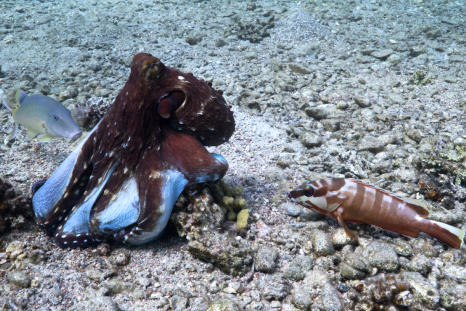Your support helps us to tell the story
Support NowAs your White House correspondent, I ask the tough questions and seek the answers that matter.
Your support enables me to be in the room, pressing for transparency and accountability. Without your contributions, we wouldn't have the resources to challenge those in power.
Your donation makes it possible for us to keep doing this important work, keeping you informed every step of the way to the November election

Andrew Feinberg
White House Correspondent
Octopuses are usually considered to be solitary creatures, but new research suggests they might sometimes socialise with fish in order to share the responsibility of hunting.
The findings broaden our understanding of the shared social life of octopuses and fish, scientists say.
In the past, the animals have been seen to hunt together for shared prey such as molluscs and crustaceans.
These findings expand our current understanding of what leadership is and what sociality is
Study authorsThe new study sheds more light on this, revealing that when hunting prey together, some octopus and fish species appear to share leadership.
However, it is not always a harmonious group hunt, with the scientists observing aggression among group members, including fish displacing others by darting towards them, and octopuses punching some fish to the outer areas of the group.
After analysing data from 120 hours of dives, the scientists found that leadership is shared for different types of decisions.
For example, goatfish specialised in deciding where the hunting pack moves — while the octopus decided whether and when the move would be made.
The authors note that although other types of mixed-species hunting is known – such as badger–coyote, mixed birds, and moray eel–grouper groups – they appear to be less flexible in using social information to change strategy compared to octopus–fish hunting groups.
Writing in the Nature Ecology and Evolution journal, the authors say: “These findings expand our current understanding of what leadership is and what sociality is.”
Eduardo Sampaio, from the Max Planck Institute of Animal Behaviour in Germany, and colleagues tracked octopus–fish hunting packs during scuba diving expeditions in the Red Sea.
They saw 13 hunting groups consisting of one day octopus and different species of fish, including gold-saddle goatfish and blacktip groupers.
The researchers suggest that this joint effort leads to better success compared to the octopus or fish acting alone.
Disclaimer: The copyright of this article belongs to the original author. Reposting this article is solely for the purpose of information dissemination and does not constitute any investment advice. If there is any infringement, please contact us immediately. We will make corrections or deletions as necessary. Thank you.



